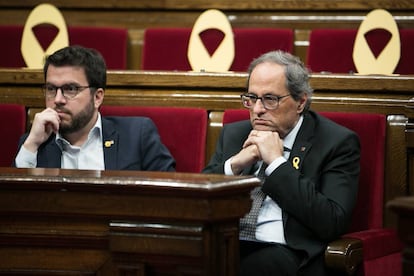Catalan separatists feel effects of their new parliamentary minority
Three proposals fail to secure passage after pro-independence bloc loses votes and disagrees over how to replace them

The separatist bloc in the Catalan parliament has lost its majority, and the effects were clear to see on Tuesday, when several proposals on self-determination, abolishing the Spanish monarchy and the existence of “political prisoners” failed to secure passage.
The back-to-back defeats underscore a new division among separatist parties over the voting rights of the Catalan leaders who either fled Spain or were placed in pre-trial custody after the failed unilateral independence declaration of October 2017.
It is evident that we will have to seek support
Elsa Artadi, government spokesperson
The two main separatist parties, Catalan Republican Left (ERC) and Junts per Catalunya (JxCat), disagree on whether these leaders should be allowed to cast delegated votes.
Elsa Artadi, the Catalan government’s spokesperson, admitted that the executive will now have to make a bigger effort to craft alliances with non-separatist forces to keep legislative activity going.
“It is evident that we will have to seek support,” she said, blaming the Spanish courts for the situation. “As a government we denounce the interference by [Supreme Court] Judge Llarena in the normal functioning of parliament.”
Substitutes
In July, the Spanish Supreme Court confirmed that six independence leaders would be prosecuted for rebellion, sedition and misuse of public funds, including ousted Catalan premier Carles Puigdemont, who is living in Belgium. All six individuals, who earned a parliamentary seat at the December 21 elections, were automatically suspended as regional deputies and lost their voting rights.

But the judge added that all six could appoint a replacement to ensure that the same parliamentary balance would be preserved, and that the criminal proceedings would not interfere with the outcome of the December election.
Oriol Junqueras and Raül Romeva of ERC, who are both in pre-trial custody, named a substitute. Their decision was based on a report by the Catalan parliament’s legal counsel confirming that failing to appoint one would result in a lost vote.
But the four deputies for Junts per Catalunya (JxCat) – Carles Puigdemont, Jordi Turull, Josep Rull and Jordi Sànchez – refused to name a substitute and insisted that their own vote should be counted. Another ERC deputy, Toni Comín, who fled to Brussels and is still pending a review of his appeal, has had his vote suspended as well.
Up until the last minute, JxCat attempted to convince the Catalan parliament’s governing board to let Puigdemont and his aides cast a delegated vote, but the other parties on the board, including ERC, rejected this request.
The king, repression and self-determination
The chamber was voting on a proposal to proclaim Catalonia’s “inalienable” right to self-determination, and on a text lamenting “the violence, the repression and the lack of legal guarantees” in Spain. Both of those votes produced a 65-65 tie in three rounds. A third proposal condemning King Felipe VI for his October 3, 2017 speech “against Catalan institutions and their legitimate representatives” also failed to pass.
The division in the pro-independence camp casts doubts on how Quim Torra, the regional premier, will make good on his pledge to see the political term through, at least until a verdict is returned on the upcoming trial of secessionist leaders.
Speaking from prison, ERC leader Junqueras said that “above all we have to preserve the pro-independence majority; we cannot jeopardize the achievements of December 21 [the last regional election].”
While JxCat and ERC together won 66 seats out of 135 at the December election, the loss of five votes (seven suspended and two earned back through substitutes) has brought their presence down to 61. On Tuesday, the four lawmakers for the far-left Popular Unity Candidacy (CUP) added their votes to the separatist bloc, but even this was not enough to get their proposals passed.
The other parties inside the Catalan parliament – Ciudadanos, the Catalan Socialists (PSC), the leftist Catalunya en Comú and the conservative Popular Party (PP) – represent a combined 65 seats.
English version by Susana Urra.
Tu suscripción se está usando en otro dispositivo
¿Quieres añadir otro usuario a tu suscripción?
Si continúas leyendo en este dispositivo, no se podrá leer en el otro.
FlechaTu suscripción se está usando en otro dispositivo y solo puedes acceder a EL PAÍS desde un dispositivo a la vez.
Si quieres compartir tu cuenta, cambia tu suscripción a la modalidad Premium, así podrás añadir otro usuario. Cada uno accederá con su propia cuenta de email, lo que os permitirá personalizar vuestra experiencia en EL PAÍS.
¿Tienes una suscripción de empresa? Accede aquí para contratar más cuentas.
En el caso de no saber quién está usando tu cuenta, te recomendamos cambiar tu contraseña aquí.
Si decides continuar compartiendo tu cuenta, este mensaje se mostrará en tu dispositivo y en el de la otra persona que está usando tu cuenta de forma indefinida, afectando a tu experiencia de lectura. Puedes consultar aquí los términos y condiciones de la suscripción digital.








































